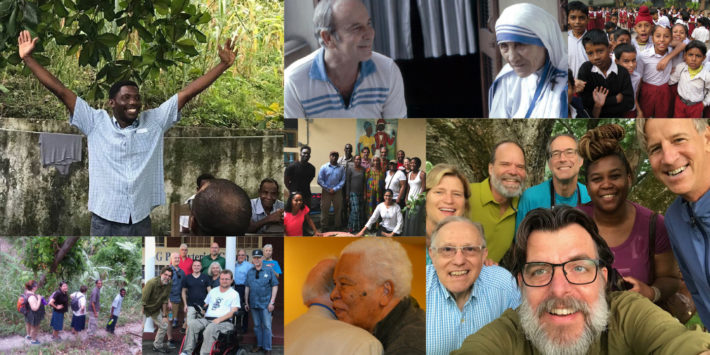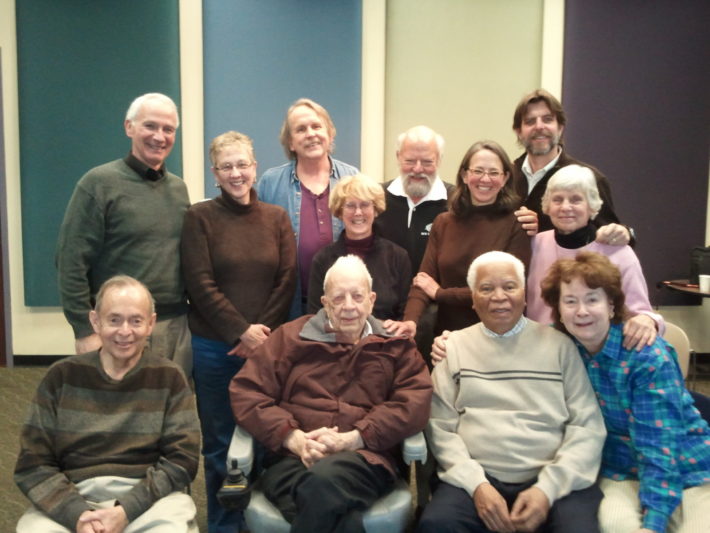
As we celebrate our 40th anniversary at Faith and Money Network, we’re taking a look back at our legacy, revisiting the programs and events we’ve introduced over the decades, and outlining the possibilities that lie ahead for our small but mighty organization.
Don McClanen founded the organization as the Ministry of Money after holding his first unofficial workshop in 1976. Don found himself grappling with questions around money in his own life, and so he began talking about it in the late 1970s at Wellspring, the retreat center run by the Church of the Saviour. His reflections — and his charismatic presence while speaking frankly about personal giving and finances — resonated with a growing audience.
Faith and Money Network formally began in 1982, when founder Don McClanen started the Ministry of Money as a mission of the Church of the Saviour in Washington, D.C., after a successful career as the founder and executive director of the Fellowship of Christian Athletes.
“People started coming from everywhere who wanted to talk about money in a safe place,” says current Faith and Money Network director Mike Little. “Jesus spoke about money, but it’s often the last thing we’ll talk about in church.”
The Ministry of Money plants its roots
From the beginning, the Ministry of Money communicated a clear philosophy to those who attended its retreats and workshops: We don’t have a lot of answers for you, but we have lots of questions to help you work on your relationship with your faith and your money.
In its early years, the Ministry of Money brought people to Washington, D.C., to meet others and to hear from speakers who were ready to help them explore their relationship with their money through a lens of faith, personal values and spiritual beliefs. The Ministry’s earliest offerings consisted of entry-level weekend workshops, which took place over two days and introduced attendees to a personal exploration of spirituality and wealth, anchored in a biblical reality, and advanced workshops, which often featured prominent theologians as speakers, including Walter Brueggemann, Richard Rohr and Henri Nouwen.
In the 1980s, the Ministry of Money began to host what were then called reverse mission trips, now known as Trips of Perspective. Mike Little says that the organization sees this tradition as a response to a typical mission trip: rather than going to a place like Haiti or Bosnia or Appalachia to change it, Faith and Money Network sends people to listen, to learn and to be changed by the relationships they form and the experiences they have along the way.
Many members of the Faith and Money Network first encountered the organization by attending Trips of Perspective, including board president Paul Taylor and his wife Cara. They went to Haiti with the Ministry of Money in 1987, where they worked respectively in a wound and dental care clinic and a home for the dying run by the Missionaries of Charity.
“The impact of being amidst poverty, seeing it, smelling it, touching it; it just can’t help but give you a contrast to middle-class life in the U.S.,” Paul says.
The couple’s conversations on the trip and their experience was like “an advanced education” in the effects of poverty, Paul says, and within days of their return, the local Catholic Worker house in Sacramento contacted Cara Taylor to ask her to start a home for people living with AIDS — something she only felt qualified to do because of her brief but affecting experience with the Missionaries of Charity in Port au Prince.
Programming pillars and new leadership
In addition to key programs like workshops and Trips of Perspective, Faith and Money Network offers other important tools to those looking to transform their relationship with money.
The signature piece of Faith and Money Network’s programming is the Money Autobiography, created by Elizabeth O’Connor, an early member of the Ministry of Money. Writing a money autobiography allows an individual to begin to better understand their behaviors and emotions evoked by money.
This activity became a turning point in board vice-president Susan Taylor’s life. She completed her money autobiography at her first Ministry of Money retreat in 1987, when she was a graduate student in economics, and she says it was “quite the contrast” to what she was learning in university classrooms.
Today, Susan still begins with the personal when she’s focusing on issues of faith and money, whether that’s in her professional life as a partner with Just Money Advisors or as a speaker and writer for Faith and Money Network and other organizations.
“I’ve focused on personal household practices instead of big systemic issues because I feel like we’ve created this mess one convenient decision at a time. As Dorothy Day would say, I want to make it easier for people to be good. That’s why community around this kind of work is so important. Getting support, getting ideas, having fun with it, those are the reinforcing pieces of the work,” Susan says.
Susan says that she finds this inspiration and fellowship at Faith and Money Network, whether she’s in a board meeting or leading a Sabbath Economics workshop.
Study groups, like the household covenant groups formed after the Sabbath Economics workshop and recurring Money, Faith and You groups, are another key Faith and Money Network offering. They offer participants an opportunity to build the community that Susan mentions and, as Mike says, create “a safe place to wrestle with the question of how much is enough.”
For those wanting spiritual accompaniment and accountability as they delve into their relationship to money, Faith and Money Network also offers money mentoring.
“That’s where for some people particularly, that transformation can take place,” says Susan. “So many money issues are so deeply personal that some of us never would speak about it in a group.”
Mike Little became director of Faith and Money Network in 2007, and in his leadership role, he offers a pastoral approach as a money mentor and as a leader for the organization, say board members.
“We are so fortunate with Mike’s roots in the Church of the Saviour that he brings that reality of a life rooted in the awareness of spirituality and wealth and biblical economics, and then is able to preach it — he can really do that authentically,” says Paul Taylor.
Susan Taylor and her husband Andy Loving joined the board of directors in 2008, a time that challenged many nonprofits and donor-based organizations who had to quickly adapt to the realities of the Great Recession.
Faith and Money Network survived thanks to Mike’s capable leadership, says Susan. “I thought that Mike was the perfect leader at that time, because I saw other organizations that waited too long and refused to change anything until they were just broke. Mike was much more proactive, bringing the budget to us and asking what we were going to do. It was still painful to shrink the vision for a while, but because he led, we pulled through.”
Evolving into Faith and Money Network
The Ministry of Money rebranded in 2009, becoming Faith and Money Network. Some mourned the loss of the organization’s original identity, but others felt the new name better reflected an evolving reality — and poised the organization to address systemic issues that affect people’s relationship to their faith and their finances.
Paul Taylor explains, “The name [Ministry of Money] could give the perception that we were a funding agency, as opposed to what we really were, which was a group aimed to get North Americans to grapple with the reality of wealth, and certainly a Christian organization, primarily to get Christians to really look at what is biblically called for in terms of wealth.”
At the beginning, the organization often asked people attending retreats, workshops and engaging with Faith and Money Network programs to start by considering their personal giving. Today, the organization has expanded the breadth of its focus, asking individuals to think about how small actions affect bigger systems of power and influence. Leadership has also taken on more responsibility to commit to systemic change, as demonstrated in the network’s recent racial equity statement.
“The organization has evolved to address many aspects of the ways we relate to money,” says Susan. “We’re not just talking about giving, but also our spending, our earning, our relationship to caring for the earth. We’ve gotten bolder about talking about giving as redistribution. That’s part of the evolution that I’ve seen [at Faith and Money Network] that feels like it addresses the conversation of our times.”

‘Needed now more than ever’
Looking ahead, Faith and Money Network leaders see potential and possibility in the organization’s future.
It can feel like the organization’s work is making a small ripple in a big pond, says Paul Taylor, but that’s why continuing the mission is so important. “Thinking biblically, it’s obvious to me that the subject is so unpopular that that’s why a person like Jesus had to be killed, because he rattled the cage. Ultimately, Christianity is extremely revolutionary. To get people to really get on fire is difficult.”
Faith and Money Network has proven for four decades now that stoking that fire in others is possible, and the effort reverberates. Although the coronavirus pandemic put an indefinite stop to some of the organization’s key programs like Trips of Perspective, it also revealed the silver lining in embracing a digital-first philosophy for communicating with members nationwide. Thanks to the organization’s work with consultant Heidi Thompson in proactively pivoting to online events and communication, Faith and Money Network’s online small groups have had a 525% increase in attendance over the past two years.
Mike hopes that Faith and Money Network’s future will continue to hold more collaboration with people who are doing this work, whether that’s in household covenant groups, seminary partnerships or developing material with theologians.
“We want to be a voice of conscience in this culture of scarcity and consumerism — to be a part of a movement of others who are trying to push back at the way that Jesus has been co-opted,” Mike says.
Paul believes the concept of the Manna Jar is one message that can help the organization continue to be a voice of conscience. “To me, the crux of spirituality and wealth — so much comes down to understanding what enough is, and being satisfied with enough.”
Susan agrees that now especially is a time when Faith and Money Network can be an answer for people who are seeking a better solution to the ills of modern life.
“I feel like we’re needed now more than ever. The pitfalls of trying to be a faithful human in this economy are many and deep,” she says.
Susan says that Faith and Money Network’s roots in Scripture prove that as much as the organization has grown in the past 40 years, it has endless room for more seekers and continued reinvention. “The reason that the scriptural stuff is so exciting to me is that we’ve had these same questions since way before capitalism. It’s really about the human heart, and faith communities are uniquely positioned to address that aspect of our attachment to self and money over our attachment to others and community.”
As Faith and Money Network celebrates 40 years of outreach and ministry, director Mike Little continues to believe in the culture of possibility that the organization promotes. He continues to take his work a day at a time, 14 years on at the helm of the organization, and looks forward to the relationships and collaborative opportunities that will come in the future.
For him, Faith and Money Network has always espoused the philosophy at the core of anyone’s transformative relationship with their beliefs and their money: “You can’t do this work alone.”
By Brittany Wilmes | January 20, 2022
Brittany Wilmes is a freelance writer, project manager and strategic consultant based in Portland, Oregon